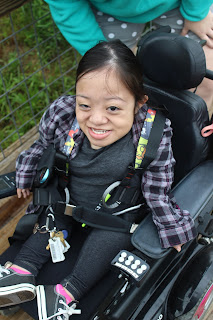Guest post by Xuan Truong
I was sitting in the passenger seat of a pickup truck at Young Life camp. My head barely reached the bottom of the truck door window. I looked up and stared fearfully at my friend who had spiritually mentored me during my last semester as an undergrad. “What am I doing?” I yelled through the crack of the window. All I got for a response was a smile and a chuckle. I could tell she had been excitedly anticipating this moment for days. She was going to have a blast watching me from below. Fear began to take a stronger grip as we made our way up the mountain. I listened as the driver made small conversation with my zip-line partner, trying not to think about what I just agreed to.
Zip-lining itself was not my main concern. It was the impact of the stopping brakes at the end that I
feared would crush my bones. In this case, the camp staff decided not to use the brake, but instead have someone catch me. I thought that was the worst idea ever. Having my body crash into some guy I barely met. What am I even doing up here in the mountains, at the hands of strangers? I am just a little person, not even 3 feet tall. What am I doing going on a zip-line? My parents would kill me.
I have a condition called Osteogenesis Imperfecta (OI) or brittle bone disease. Growing up, I was constantly reminded of my limitations. Statements like you can’t do this, you aren’t strong enough. You are too small. You are too weak. Your voice isn’t loud enough. You will always need help. Those phrases tore at my self-esteem, my core. They were repeated over and over again by not just my parents, but by most of my relatives and people who would barely know me. My world was a preset box of my inability.
But here I was on top of this cliff, watching as the crewmember attaches the hooks to the line. These hooks would be the security between the trench below and me. For the past five years I have been breaking the limitations my family has imposed on me one by one. It surprised them but more importantly, I surprised myself. From moving out on my own, attending multiple higher-level institutions and travelling abroad without my parents, I soon became known as the “adventurous” one in my family. Adventurous indeed. I was about to do something that many people in normal physical conditions would never choose to do. The lift that the camp employee was standing on began to lower. I was now fully strapped on to the zip-line. He let go and I slowly descended down.
The actual experience on that zip-line was a bit anti-climatic. Because of my weight, the speed at which I was carried down was much slower than expected. Nonetheless, when asked I told people
that this was my favorite part about camp. It taught me a lot about fears. Not just my own, but overcoming fears that others have placed on me. From then on, I realized most of the limitations I thought were my own were actually from others. Society has conditioned us to see the disability before the ability. In the country that my parents originate from, a person such as I going off to college was unheard of. Those restrictions they placed on my life were motivated by fear. In turn, I inherited their fears and subconsciously turned them into my own truths. When someone tells you it can’t be done, it’s more of a reflection of their limitations not yours.
As humans we all have our own individual limitations. That is what makes us unique. I have accepted long ago that I will never be able to walk. That alone closes a lot of doors both personal and career opportunities. However, recently I have started to notice how my own so-called “limitations” have been opening conversations about having a disability.
I now define my own limits. I know what I am capable of, when I need assistance, and when a task is not suitable for me to complete. My family, my friends, or society no longer defines these limitations. More importantly than that, I want others with disabilities to have opportunities to do something so daring that it transcends their own barriers. I want them to have my zip line experience.


